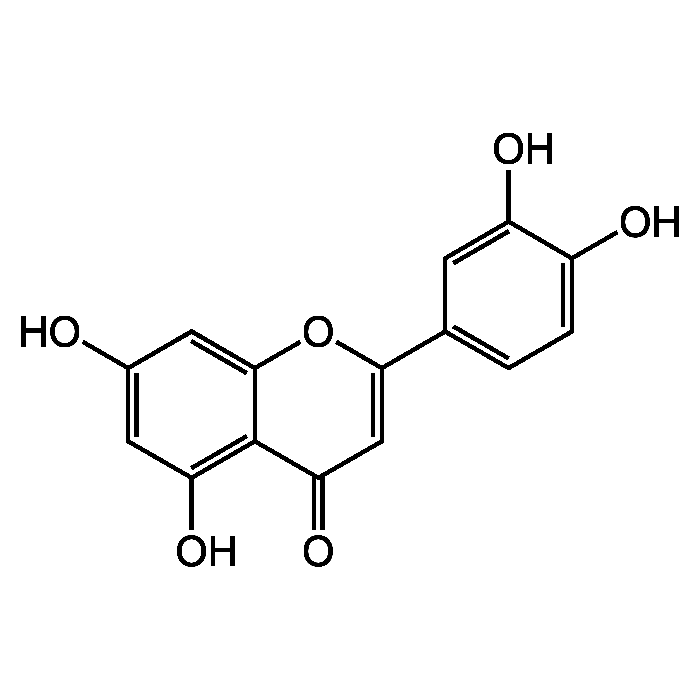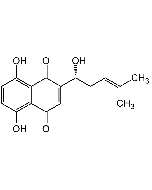Cookie Policy: This site uses cookies to improve your experience. You can find out more about our use of cookies in our Privacy Policy. By continuing to browse this site you agree to our use of cookies.
AdipoGen Life Sciences
Luteolin
As low as
20
CHF
CHF 20.00
In stock
Only %1 left
AG-CN2-0098-M0055 mgCHF 20.00
AG-CN2-0098-M02525 mgCHF 60.00

| Product Details | |
|---|---|
| Synonyms | 3',4',5,7-Tetrahydroxyflavone; Luteolol; BRN 0292084; C.I. Natural Yellow 2; Digitoflavone; Flacitran; Flavopurpol; Daphneflavonol; Argemexitin |
| Product Type | Chemical |
| Properties | |
| Formula |
C15H10O6 |
| MW | 286.2 |
| CAS | 491-70-3 |
| RTECS | LK9275210 |
| Source/Host Chemicals | Synthetic. |
| Purity Chemicals | ≥98% (HPLC) |
| Appearance | Yellow solid. |
| Solubility | Soluble in DMSO, DMF, methanol or ethanol. Slightly soluble in water. |
| InChi Key | IQPNAANSBPBGFQ-UHFFFAOYSA-N |
| Smiles | OC1=CC(O)=C2C(=O)C=C(OC2=C1)C1=CC=C(O)C(O)=C1 |
| Shipping and Handling | |
| Shipping | AMBIENT |
| Short Term Storage | +4°C |
| Long Term Storage | -20°C |
| Use/Stability | Stable for at least 2 years after receipt when stored at -20°C. |
| Documents | |
| MSDS |
 Download PDF Download PDF |
| Product Specification Sheet | |
| Datasheet |
 Download PDF Download PDF |
Description
- Anticancer and antimetastatic agent that induces apoptosis and modulates autophagy. Shown to inhibits kinase signalling, including PKC(ε) and Src kinase, HDAC, Phosphatidylinositol 3-kinase (PI3K) / Akt and p90 ribosomal S6 kinase (RSK1/RSK2).
- Topoisomerase I Inhibitor.
- Anti-inflammatory agent that inhibits 15-Lipoxygenase (15-LOX) and IL-6 production.
- Antioxidant. Free radical scavenger.
- Antiadipogenic agent, that inhibits PPAR-γ, fatty acid synthase (FAS) and α-Glucosidase.
- Neuroprotective. Monoamine transporter activator and inhibitor of phosphodiesterases 1-5 (PDE1-5).
- Shown to selectively inhibits chymotrypsin-like and trypsin-like proteasome catalytic activity.
Product References
- Effects of luteolin and quercetin, inhibitors of tyrosine kinase, on cell growth and metastasis-associated properties in A431 cells overexpressing epidermal growth factor receptor: Y.T. Huang, et al.; Br. J. Pharmacol. 128, 999 (1999)
- Inhibition of alpha-glucosidase and amylase by luteolin, a flavonoid: J.S. Kim, et al.; Biosci. Biotechnol. Biochem. 64, 2458 (2000)
- Luteolin, an emerging anti-cancer flavonoid, poisons eukaryotic DNA topoisomerase I: A.R. Chowdhury, et al.; Biochem. J. 366, 653 (2002)
- Inhibition of matrix-proteases by polyphenols: Chemical insights for anti-inflammatory and anti-invasion drug design: L. Sartor, et al.; Biochem. Pharmacol. 64, 229 (2002)
- Luteolin inhibits the nuclear factor-kappa B transcriptional activity in Rat-1 fibroblasts: S.H. Kim, et al.; Biochem. Pharmacol. 66, 955 (2003)
- Inhibition of 15-lipoxygenases by flavonoids: Structure-activity relations and mode of action: C.D. Sadik, et al.; Biochem. Pharmacol. 65, 773 (2003)
- Induction of apoptosis by luteolin through cleavage of Bcl-2 family in human leukemia HL-60 cells: A.C. Cheng, et al.; Eur. J. Pharmacol. 509, 1 (2005)
- Luteolin inhibits insulin-like growth factor 1 receptor signaling in prostate cancer cells: J. Fang, et al.; Carcinogenesis 28, 713 (2007)
- Luteolin reduces IL-6 production in microglia by inhibiting JNK phosphorylation and activation of AP-1: S. Jang, et al.; PNAS 105, 7534 (2008)
- Inhibition of fatty acid synthase by luteolin post-transcriptionally down-regulates c-Met expression independent of proteosomal/lysosomal degradation: D.T. Coleman, et al.; Mol. Cancer Ther. 8, 214 (2009)
- Physicochemical properties and antioxidant activities of luteolin-phospholipid complex: K. Xu, et al.; Molecules 14, 3486 (2009)
- Luteolin inhibits adipogenic differentiation by regulating PPARgamma activation: H.S. Park, et al.; Biofactors 35, 373 (2009)
- Functional activation of monoamine transporters by luteolin and apigenin isolated from the fruit of Perilla frutescens: G. Zhao, et al.; Neurochem. Int. 56, 168 (2010)
- Apigenin, Chrysin, and Luteolin Selectively Inhibit Chymotrypsin-Like and Trypsin-Like Proteasome Catalytic Activities in Tumor Cells: Y.-X. Wu & X. Fang; Planta Med. 76, 128 (2010)
- Luteolin, a non-selective competitive inhibitor of phosphodiesterases 1-5, displaced [3H]-rolipram from high-affinity rolipram binding sites and reversed xylazine/ketamine-induced anesthesia: M.C. Yu, et al.; Pulmon. Gastrointest. Urogen. Pharmacol. 627, 269 (2010)
- Luteolin inhibits protein kinase C(epsilon) and c-Src activities and UVB-induced skin cancer: S. Byun, et al.; Cancer Res. 70, 2415 (2010)
- Inhibition of cell survival, invasion, tumor growth and histone deacetylase activity by the dietary flavonoid luteolin in human epithelioid cancer cells: S. Attoub, et al.; Eur. J. Pharmacol. 651, 18 (2011)
- Autophagy inhibitor chloroquine enhanced the cell death inducing effect of the flavonoid luteolin in metastatic squamous cell carcinoma cells: L. Verschooten, et al.; PLoS One 7, e48264
- Raf and PI3K are the molecular targets for the anti-metastatic effect of Luteolin: H.Y. Kim, et al.; Phytother. Res. 27, 1481 (2013)
- Luteolin is a novel p90 ribosomal S6 kinase (RSK) inhibitor that suppresses Notch4 signaling by blocking the activation of Y-box binding protein-1 (YB-1): K.M. Reipas, et al.; Oncotarget 4, 329 (2013)
- Flavonoids from Ericameria nauseosa inhibiting PI3K/AKT pathway in human melanoma cells: T. Hell, et al.; Biomed. Pharmacother. 156, 113754 (2022)







